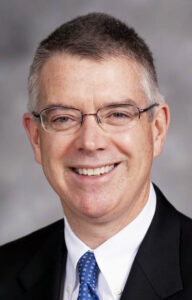By Dr. Tim Millea
In late July, the Secretary of Health and Human Services, Xavier Becerra, announced a proposed rule that would dramatically alter the Affordable Care Act (ACA). Section 1557 of the original Obama-era ACA relates to discrimination based on gender identity. The Biden Administration’s proposed rule continues the emphasis against discrimination but also prohibits physicians and other health care professionals from refusing to recommend or perform treatments and surgeries that are contrary to their conscience or religious beliefs. In addition, the medical professional would be required to refer the patient to someone who would provide that treatment. Failure to follow the requirements could result in the suspension of the license to practice, which could lead to the end of many careers.

The primary concern in this debate pertains to the prohibition of medical professionals to practice according to their informed conscience and/or faith. Such regulations would be clear violations of the First Amendment protecting freedom of religion and freedom of speech. I would like to take a long-term view of the impact of this potential rule on the medical field.
Why do young women and men elect to enter a medical career? What are the traits that we want to see in them? Historically, medicine has attracted the best and the brightest of our young people, those who are highly intelligent, hardworking, responsible and compassionate. A classic adage among physicians is to remember the “three A’s”: you must have ability, availability and affability. The challenge of working with patients and sharing responsibility for their well-being requires these three and much more.
What impact would this proposed rule have on our future physicians and their colleagues in health care? Imagine that you are a high school or college student considering a medical career. You then discover that you would be required to treat or refer a patient who wants a treatment that is contrary to your principles, such as abortion or physician-assisted suicide. Why would you enter a career that requires at least seven years of education and training and incur more than $200,000 in student loans to enter a career that prohibits you from thinking for yourself and offering your recommendations for the best options for your patient?
The U.S. Bureau of Labor Statistics projects a shortage of more than 100,000 physicians by 2030. The deficit will surely increase if the proposed federal rule is finalized. Many physicians will leave their careers earlier than planned to avoid the threats and potential litigation. Equally worrisome is the decision of potential physicians, nurses and other health care professionals to opt out of those careers and pursue other paths. The deficit in the number of medical professionals will erode further, with consequences for patients.
Where will the shortage of medical professionals be felt most acutely? The most immediate and troubling effect will be among those whose access to health care is limited already. People living in economically challenged neighborhoods and in rural areas will not have access to the care that already is a struggle to obtain. Management of their chronic diseases, complicated pregnancies and childhood illnesses will be sorely lacking. Those areas with greater financial security will attract the hospitals and health care services driven by economic factors; the poor and underprivileged will be neglected.
Lack of health care professionals would also adversely affect medical missions. Most of these missions, whether domestic efforts serving immigrants and refugees or international efforts serving underdeveloped countries, are the work of faith-based organizations. These groups rely on dedicated and devout believers who feel called to combine their work with their faith. If their faith is not respected, they will not be inclined to enter a medical field. The suffering will spread beyond America’s borders.
When viewed through a Catholic lens, many facets of this potential rule for health care professionals directly conflict with Catholic Social Teaching. The life and dignity of each person will be compromised, as those who care for them will not be allowed to provide their informed advice for the person’s best interest. As Catholics, we are called to protect human rights and to meet our responsibility to one another and to our society as a whole. The requirements of this proposed rule would prevent medical professionals from meeting their responsibility to those looking to them for care. Finally, the Church calls us to put the needs of the poor and vulnerable first. Proposed rule 1557 would result in a dramatic decrease in the number of faithful and conscientious individuals choosing a career that cares for those less fortunate.
The federal government provides a comment period for the public to provide feedback about proposed regulations such as 1557. That period will end Oct. 3, 2022. The volume and content of those comments can have an impact on the final decision regarding the rule. You can review the proposed rule and submit your own comment at this link:
https://www.federalregister.gov/documents/2022/08/04/2022-16217/nondiscrimination-in-health-programs-and-activities
(Dr. Tim Millea is president of the St. Thomas Aquinas Medical Guild and a member of St. Paul the Apostle Parish in Davenport.)











